In his Viewpoint on 28 January, Leigh Corner had this to say ...
Late last year, Gwyn presented a broad political, transnational perspective on climate change. He looked at the need to minimize the build-up of greenhouse gases by limiting the increase in the human population. I want to look at a response to global warming from an individual’s perspective.
Of late I have been trying to define and live up to my personal responsibilities when it comes to climate change, not just simply espousing responsibility, but embracing it.
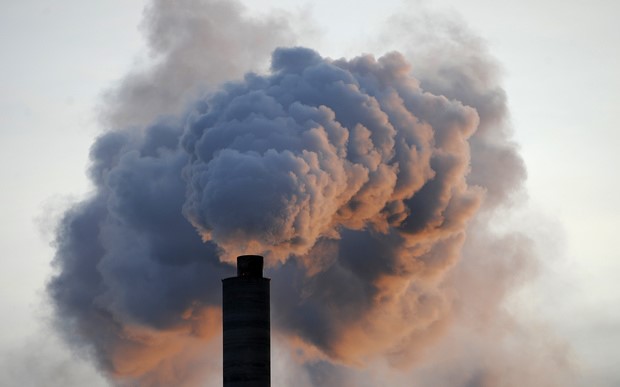 There is significant and incontrovertible evidence of climate change and global warming. I think we can accept this position without necessarily believing that human activity, burning fossil fuels and environmental degradation, are the principal causes. However, I believe human activity is the primary cause, and even if human activity is a natural phenomenon, the effects of human activity are there to be seen. We are exacerbating the changes, and we can act to mitigate those effects.
There is significant and incontrovertible evidence of climate change and global warming. I think we can accept this position without necessarily believing that human activity, burning fossil fuels and environmental degradation, are the principal causes. However, I believe human activity is the primary cause, and even if human activity is a natural phenomenon, the effects of human activity are there to be seen. We are exacerbating the changes, and we can act to mitigate those effects.
It’s well established that global warming is damaging the health of the planet and the way we are using the Earth’s resources threatens our future and that of many animals and plants. Species extinction is an inevitable endpoint. I believe the scientific data. Every time the IPCC issues a forecast it paints a worsening scenario than any previous forecast. To me these changing forecasts enhance the scientific interpretations and projections: it does not cause me to question the underlying scientific data.
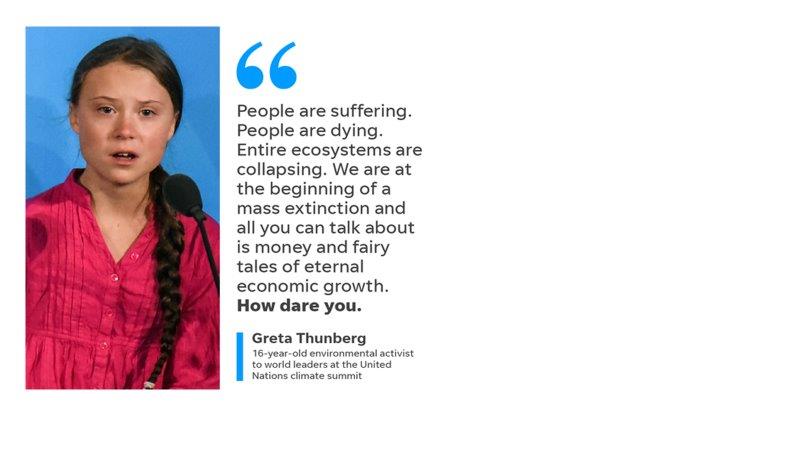 I have been very impressed with the response of younger people in our community to the risks linked to climate change. I accept their position, their genuine concerns and most of their actions.
I have been very impressed with the response of younger people in our community to the risks linked to climate change. I accept their position, their genuine concerns and most of their actions.
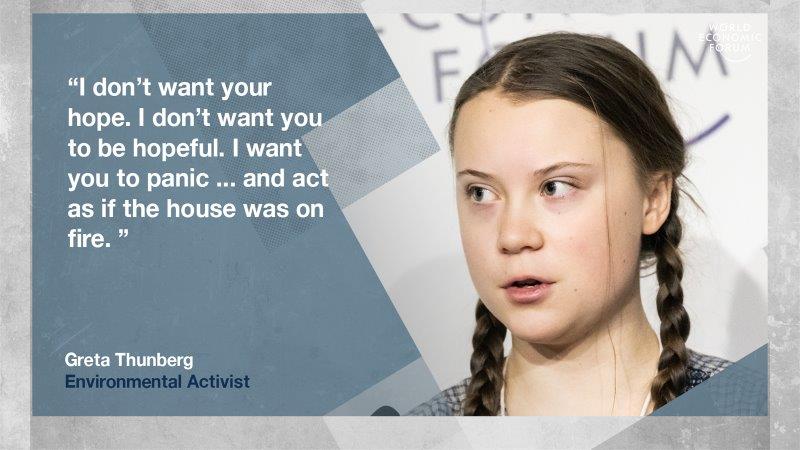 I am impressed with the remarkable young lady, Greta Thunberg, and agree with her when she challenged delegates to the 2019 U.N. Climate Change Summit: “People are suffering. People are dying. Entire ecosystems are collapsing. We are at the beginning of a mass extinction and all you can talk about is money and fairy tales of eternal economic growth. How dare you.”
I am impressed with the remarkable young lady, Greta Thunberg, and agree with her when she challenged delegates to the 2019 U.N. Climate Change Summit: “People are suffering. People are dying. Entire ecosystems are collapsing. We are at the beginning of a mass extinction and all you can talk about is money and fairy tales of eternal economic growth. How dare you.”
And when she challenged delegates to the 2019 World Economic Forum: “I don’t want your hope. I don’t want you to be hopeful. I want you to panic… and act as if the house was on fire.”
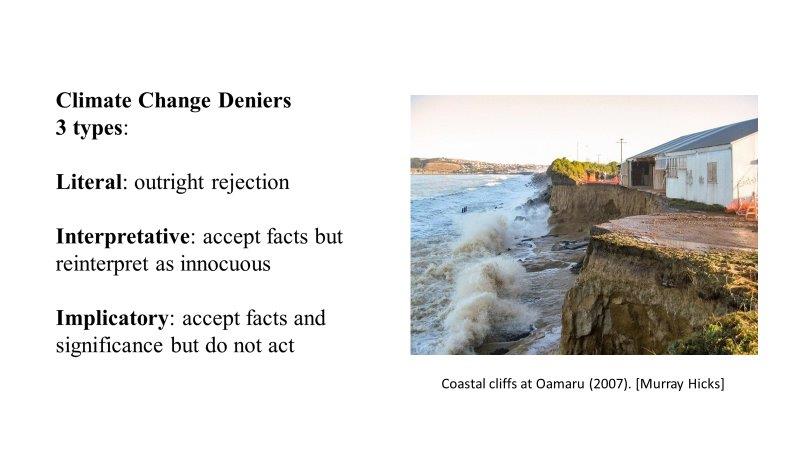 In a recent article on The Conversation website there was a list of three positions that climate change deniers can take that lead to inaction or limited actions. I was disturbed because I then had to consider my own response to climate change.
In a recent article on The Conversation website there was a list of three positions that climate change deniers can take that lead to inaction or limited actions. I was disturbed because I then had to consider my own response to climate change.
- The first is Literal denial: Simple, conscious, outright rejection.
- The second is Interpretative denial: People do not contest the facts, but interpret them in ways that distort their meaning or importance.
- And the third is Implicatory denial: This is the most insidious form of denial. Facts are not denied but the implications are denied, minimized or avoided.
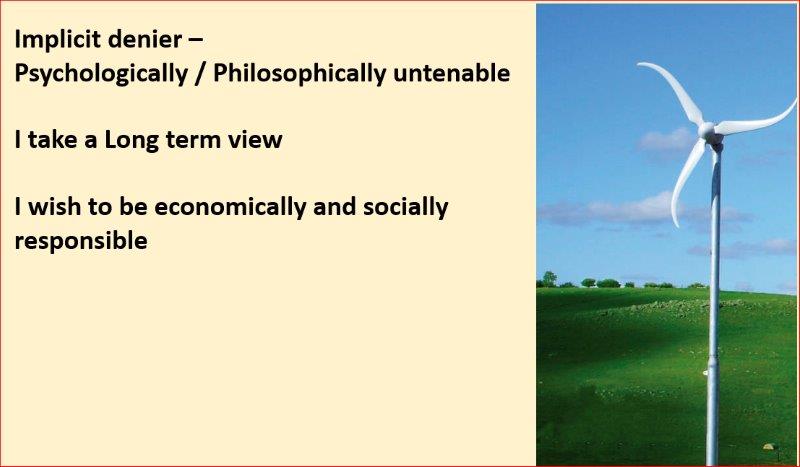 If I am a denier, then it is as an Implicit denier. I try to take a long-term view of life and human society, and I think I am being responsible. I am in a position to actively respond conscientiously to the task of reducing my environmental footprint and as a generator of greenhouse gases.
If I am a denier, then it is as an Implicit denier. I try to take a long-term view of life and human society, and I think I am being responsible. I am in a position to actively respond conscientiously to the task of reducing my environmental footprint and as a generator of greenhouse gases.
Both psychologically and philosophically, remaining an implicit denier is becoming an increasingly untenable position for me. At times I fall short of my own philosophical position, through expediency, and at times, in response to other peoples' needs. I am most conscience-stricken about using fossil fuels and, for me, that is petroleum products. The use of petrol in my chain saw, weed-eater and ride-on mower may be acceptable, especially the chainsaw as it allows me to use firewood grown on the farm. This is preferable to using electricity, even though in New Zealand most electricity is generated from renewable resources. However, 15% delivered to the national grid comes from fossil fuels. Even with electricity I try to use as little as possible, mostly for cooking and rarely for room heating. I would like to have our wind turbine repaired or replaced with solar panels so we could decrease our use of network electricity.
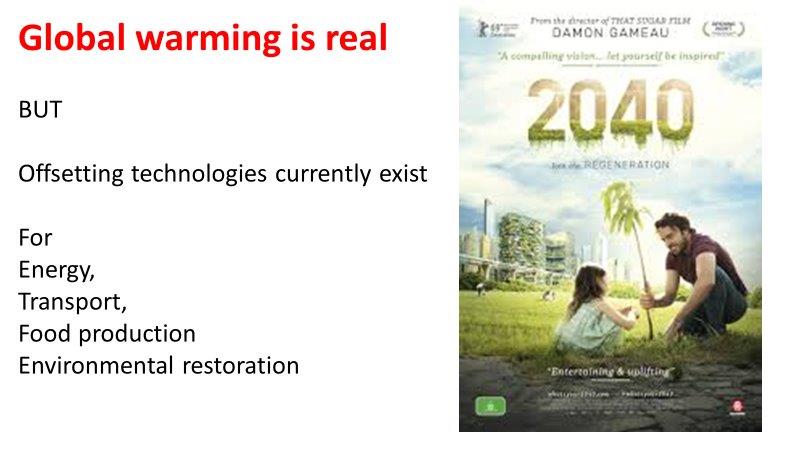 But all is not gloom and doom. Damon Gameau in his movie “2040”, does not let the facts of the global scale of warming, sea-level rise, and environmental degradation, prevent him from seeking a fairer, healthier world than we have today. He examines the technologies and practices that currently exist that can be used to offset warming. He explores the future of energy, transport, food production, and the environment if we embraced these practices today. He explores regenerative farming practices in rural Australia, a village powered by distributed solar home systems in Bangladeshi; marine permaculture experiments in the United States, and an on-demand autonomous electric vehicle fleet in New York City. The film delivers an inspiring vision of the future. As Gameau says, “we have everything we need right now to make it happen.”
But all is not gloom and doom. Damon Gameau in his movie “2040”, does not let the facts of the global scale of warming, sea-level rise, and environmental degradation, prevent him from seeking a fairer, healthier world than we have today. He examines the technologies and practices that currently exist that can be used to offset warming. He explores the future of energy, transport, food production, and the environment if we embraced these practices today. He explores regenerative farming practices in rural Australia, a village powered by distributed solar home systems in Bangladeshi; marine permaculture experiments in the United States, and an on-demand autonomous electric vehicle fleet in New York City. The film delivers an inspiring vision of the future. As Gameau says, “we have everything we need right now to make it happen.”
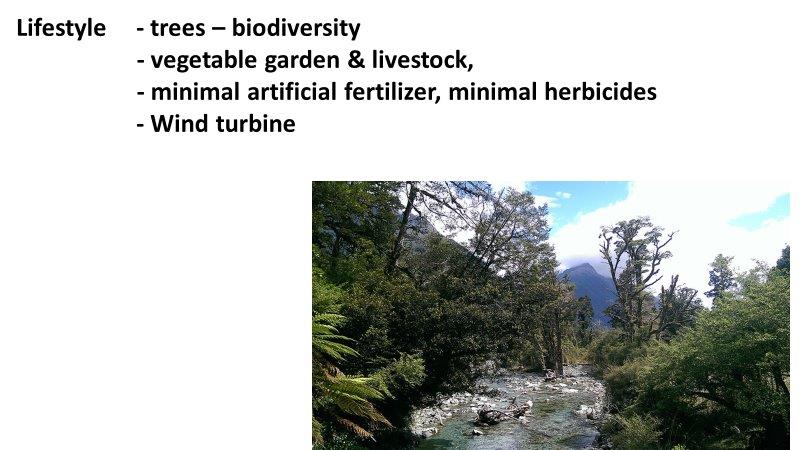 I wish to do more. On the farm we are increasing the area of trees, we do not use artificial fertilizers and we use very little herbicides. We have livestock and chickens and grow most of our meat and eggs, and I am expanding our vegetable garden.
I wish to do more. On the farm we are increasing the area of trees, we do not use artificial fertilizers and we use very little herbicides. We have livestock and chickens and grow most of our meat and eggs, and I am expanding our vegetable garden.
I have no doubt my efforts, though small, are meaningful. As with democracy where every vote counts, each of us can contribute personally to mitigating the effects of global warming caused by greenhouse gases. New Zealand is a small player on a global scale but we all contribute to the global cost. Actions are necessary, not just for future generations but for current generations as well. We, the older generation, more than any other, have contributed disproportionately to the problem and, we can - no we must - do more to combat it.
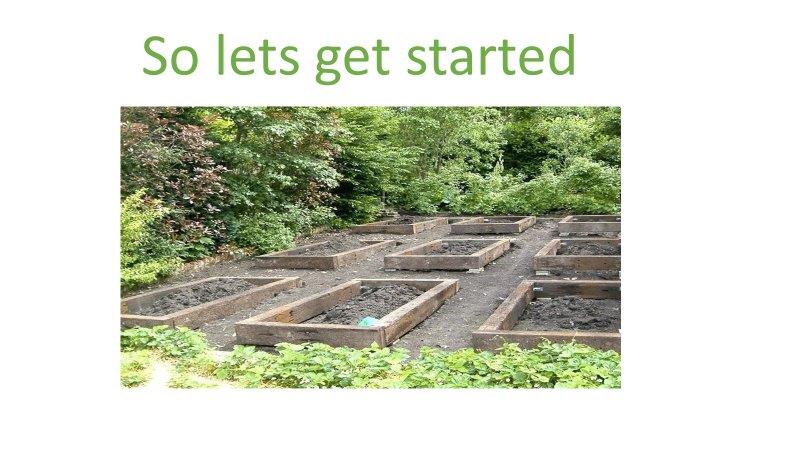 To quote the Canadian ecologist David Suzuki “Every day that goes by without serious attempts to address and act on our predicament will exacerbate the unpredictability and gravity of the problems in the future. And even where solutions are still possible, every day that passes without action ensures that the cost of attempting to resolve them will escalate.
To quote the Canadian ecologist David Suzuki “Every day that goes by without serious attempts to address and act on our predicament will exacerbate the unpredictability and gravity of the problems in the future. And even where solutions are still possible, every day that passes without action ensures that the cost of attempting to resolve them will escalate.
We know a catastrophe looms, but what does it take to act on it, and who is going to lead the way?
I say let’s get started.
